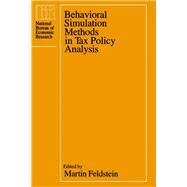Behavioral Simulation Methods in Tax Policy Analysis
, by Feldstein, Martin S.- ISBN: 9780226240848 | 0226240843
- Cover: Hardcover
- Copyright: 7/1/1983
These thirteen papers and accompanying commentaries are the first fruits of an ongoing research project that has concentrated on developing simulation models that incorporate the behavioral responses of individuals and businesses to alternative tax rules and rates and on expanding computational general equilibrium models that analyze the long-run effects of changes on the economy as a whole. The principal focus of the project has been on the microsimulation of individual behavior. Thus, this volume includes studies of individual responses to an over reduction in tax rates and to changes in the highest tax rates; a study of alternative tax treatments of the family; and studies of such specific aspects of household behavior as tax treatment of home ownership, charitable contributions, and individual saving behavior. Microsimulation techniques are also used to estimate the effects of alternative policies on the long-run financial status of the social security program and to examine the effects of alternative tax rules on corporate investment and of foreign-source income on overseas investment. The papers devoted to the development of general equilibrium simulation models to include an examination of the implications of international trade and capital flows, a study of the effects of capital taxation that uses a closed economy equilibrium model, and an examination of the effect of switching to an inflation-indexed tax system. In the volume's final paper, a life-cycle model in which individuals maximize lifetime utility subject to a lifetime budget constraint is used to simulate the effects of tax rules on personal savings.






